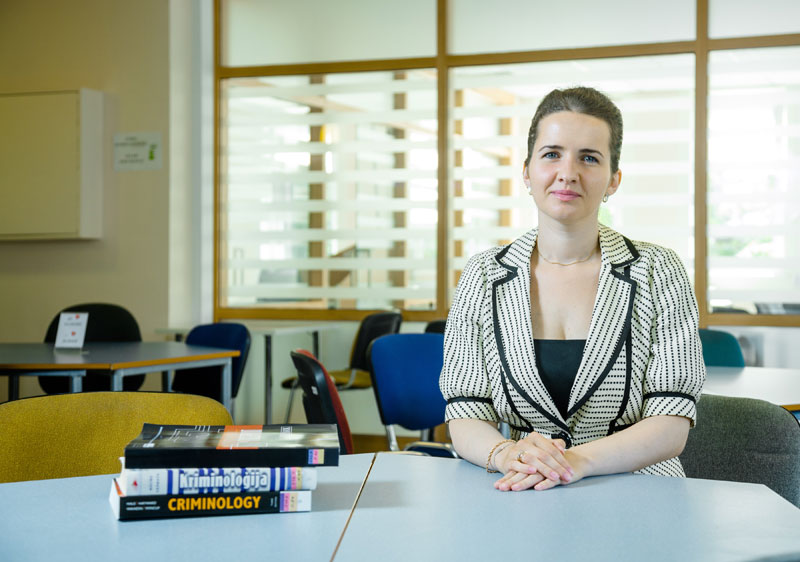Doctoral Studies Can Drastically Change Your Viewpoint and Subvert Stereotypes
RSU doctoral student Karina Zalcmane
Doctoral study programme: Law
Thesis: Criminogenic Factors of Football Fans and Prevention: Latvian and Foreign Experience
Supervisor: Assoc. Prof. Aldis Lieljuksis

WHO?
I am always open to new opportunities and welcome challenges! At secondary school, before I decided to study law, I was quite determined to enrol in the Faculty of Mechanical Engineering at Riga Technical University. Inching through traffic jams in the early morning hours I headed to my private classes in physics. I have kept the habit of doing a lot and managing as much as possible. A day before giving birth to my daughter I passed an exam in criminology and on the day when she turned three months old I passed the qualification exam in criminal law.
In addition to law, I am a qualified dance teacher and continued to teach dance classes alongside working at leading law firms such as Clifford Chance, Freshfields Bruckhaus Deringer. While acquiring my master’s degree at the University of Westminster in London, I decided to combine both these interests and study entertainment law which, at that time, was the only study programme of that type in the whole of Eurasia. I mastered sports law, IT law, contract and intellectual property law. I usually joke that we have sports, but no sports law in Latvia – the area lacks proper regulation. Having returned back home, I was determined to make a contribution to the development of sports law and criminology in Latvia. At that time, thinking about the near future, I saw myself holding a doctoral degree from Riga Stradiņš University (RSU) and passing knowledge on to the younger generation. Research is not as boring as many would tend to think – and I strengthen my confidence in this with every day that I devote to understanding the criminogenic behaviour of football hooligans.
WHAT?
My thesis is devoted to a topical phenomenon of the contemporary sports world – the offences and crimes committed by football hooligans. I try to understand why most incidents involving sports fans are attributable to individuals passionate about football. Why do they form groups which, due to their structure, can be compared to criminal gangs? And why does a lack of understanding of this subculture frequently result in conflicts in stadiums or in their vicinity?
Doctoral studies and studying a particular subject in depth can result in a fundamental shift in perception and break down stereotypes both in regards to the subject matter as well as in life in general.
WHY?
During my postgraduate studies, the situation in Ukraine and the discourse on safety in Europe intensified. Football fans played an active role in many demonstrations, not only in political ones. The events surrounding the last football championship in France swept away any doubts I may have had on the necessity of my research. There are no national studies on this subject matter, and even though Latvian fans are more peaceful than for example Poles or Russians, there have, however, been quite a number of incidents registered here too.
The construction of the new national stadium will start in the nearest future. I was involved in the development of the technical project and in years to come we will be faced with the challenge of welcoming thousands of organised football fans. The general public and law enforcement have to make the necessary arrangements in order to be prepared for games, considering that in most cases the majority of offences and violations committed by football fans take place outside the stadiums.
I have chosen the topic of my thesis not for the sake of proving that all football fans are hooligans and offenders, on the contrary the individuals who turn football into a bloody sport, and on whom I have chosen to focus, are in the minority and most football fans are peaceful lovers of the game.
HOW?
I read a lot of scientific and contemporary literature. English football fans and police officers, for example, have written quite a number of books on how to become a true fan of the Manchester United football club or how to know whether there will be a clash between fans before a game between Chelsea and Arsenal, for example. The most interesting part of my thesis is where I deal with surveys and interviews with fans, representatives of football clubs, federations, international experts in sports law and law enforcement bodies.
CONCLUSIONS
It is too early to draw any conclusions at the moment. The only thing I would like to underline is that doctoral studies and an in-depth acquisition of a particular subject can result in a fundamental shift in perception and break down stereotypes both with regard to the studied matter and life in general.
Related news
 Dissertation study on viral hepatitis A in LatviaRSU research synapses, For Students, For PhD Students, For RSU Employees, Research
Dissertation study on viral hepatitis A in LatviaRSU research synapses, For Students, For PhD Students, For RSU Employees, Research


